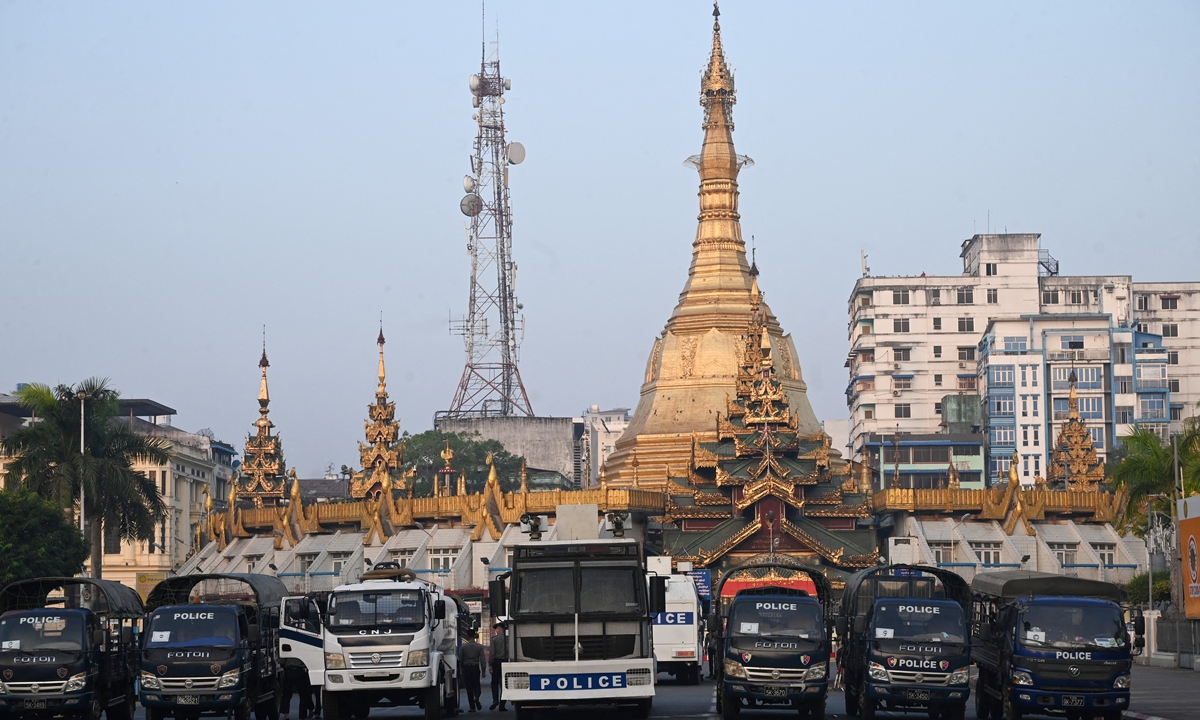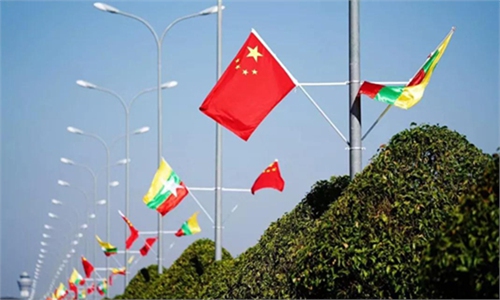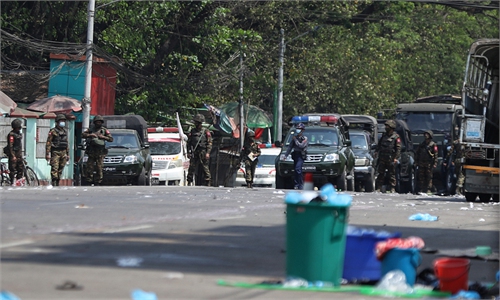
Police vehicles barricade a road outside Sule Pagoda, next to Yangon City Hall in Yangon, Myanmar on February 16. Photo: AFP
Chinese invested-projects under the Belt and Road Initiative (BRI) were untouched during the weekend riots in Myanmar, but representatives said they have upped the level of vigilance and are considering organizing for self-protection, the Global Times learned.
Local senior executives of several state-owned enterprises (SOEs) told the Global Times on condition of anonymity that their infrastructure projects in Myanmar, including a China-Myanmar crude oil and gas pipeline and Yangon New City, remain unaffected.
On Sunday, perpetrators looted and damaged 32 Chinese-invested companies inside an industrial park in Yangon, the Chinese Embassy to Myanmar confirmed with the Global Times.
As of midday Monday, there were two reported injuries among Chinese employees, and an initial tally suggested a property loss of 240 million yuan ($36.93 million).
Curfews were announced for two townships starting on Sunday night.
A Yangon-based Chinese SOE employee, who requested anonymity, told the Global Times on Monday that many labor-intensive companies in the city are planning to gather together to protect themselves and are in active communication with the Chinese Embassy.
"Many Chinese companies were overly optimistic about the situation here before, but this time they will make up their minds to impose a temporary shutdown. Wait and see," he said, adding that the company where he works has not been affected yet.
Some of the key BRI projects in Myanmar include a 2,800-kilometer China-Myanmar oil and gas pipeline running from Kyaukpyu to Kunming, Southwest China's Yunnan, and a deep water port at Kyaukpyu in the Bay of Bengal.
The pipeline transports 6 billion cubic meters of natural gas and 10 million tons of crude annually.
An employee at China Communications Construction Co (CCCC) told the Global Times on condition of anonymity that the impact of the vandalism has not extended beyond Hlaing Thar Yar. "But we will closely follow developments and prioritize security work."
CCCC is constructing a 1,500-square-kilometer new city outside Yangon, as well as highway projects connecting key Myanmar cities.
A manager with a Chinese SOE in the hydropower sector told the Global Times on Monday that the company's project in Myanmar is on standby and some of the Chinese employees have already returned to China amid the recent turmoil, but some staff will remain in Myanmar, where the company has a representative office.
The manager said that he took notice of the looting against Chinese companies but believed the company would not be directly affected, though it is watching the situation.
"[The incident] should have some impact on our project's progress, but given all the relevant factors combined, it is still hard to tell the level of the impact," said the manager.
China and Myanmar have a number of hydropower cooperation projects, including the Yeywa RCC Dam outside Mandalay, which provides 25 percent of the power for the country.
"Chinese companies in Myanmar helped develop the local economy, solve employment issues, improve local government revenue and participate in charity work. If the local government failed to deal with such an incident in a timely way and protect the development of foreign enterprises, who would want to invest in Myanmar?" said a Chinese resident surnamed Yang, who owns two hotels and one company in the Hlaing Thar Yar industrial zone. All of Yang's businesses were smashed on Sunday.
A female source with the China International Contractors Association (CICA) told the Global Times on Monday that they are still communicating with their member companies over the possible impact of the incident.
According to media reports, the incidents against Chinese companies are mainly concentrated in industrial parks - textile companies in particular - and do not involve the infrastructure projects in which the association's member firms are involved.
Around half of the projects concerning CICA are for the Belt and Road countries and regions, open data showed.
The source with CICA said that it is studying the risks and hasn't yet been told of any impact on its members.
"Myanmar is an important market, but in recent years, the business operations in the country have not been smooth, and therefore the actual projects in place are limited," she said.


